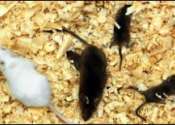Mouse version of an autism spectrum disorder improves when diet includes a synthetic oil
When young mice with the rodent equivalent of a rare autism spectrum disorder (ASD), called Rett syndrome, were fed a diet supplemented with the synthetic oil triheptanoin, they lived longer than mice on regular diets. Importantly, ...
Oct 9, 2014
0
0








